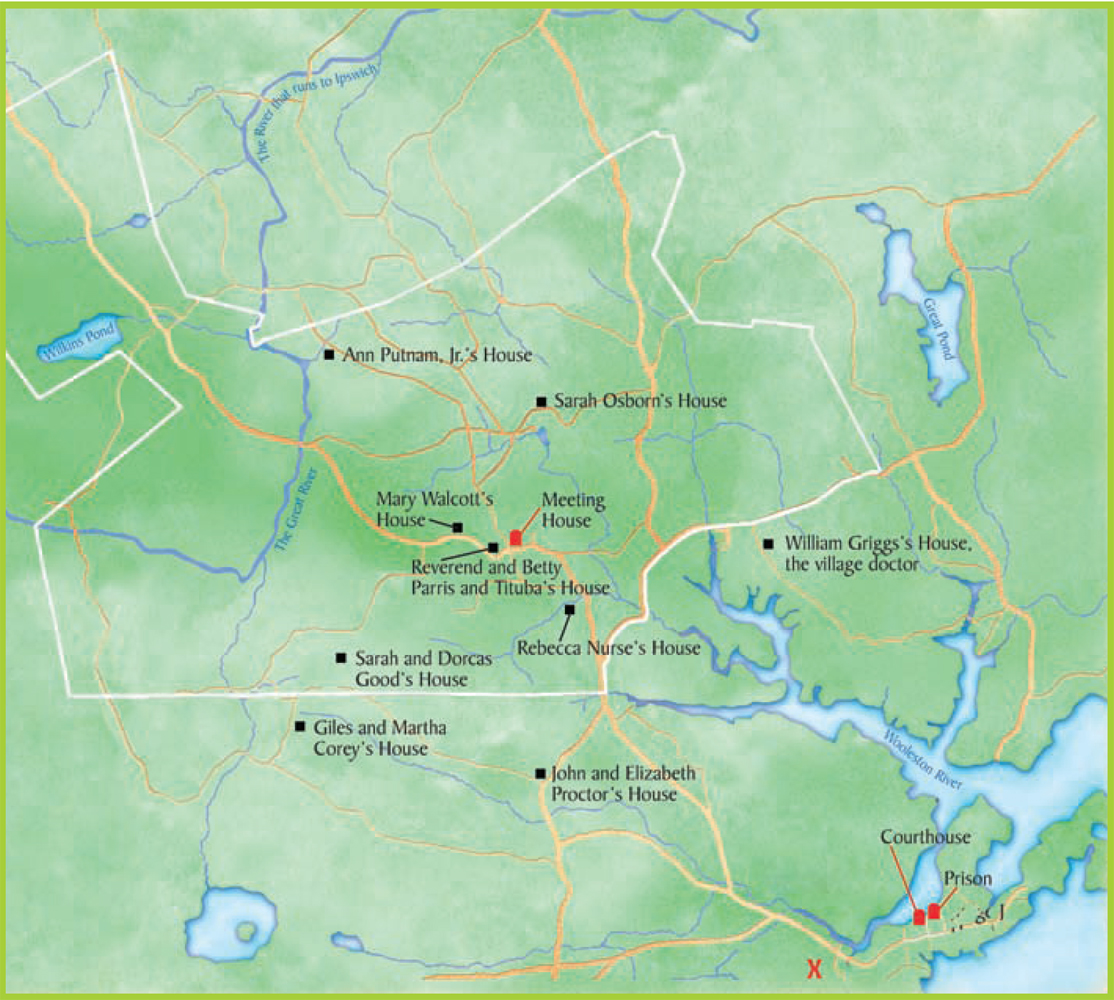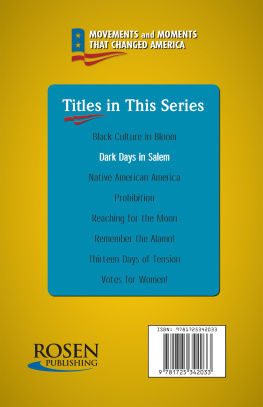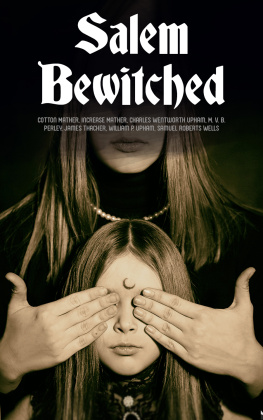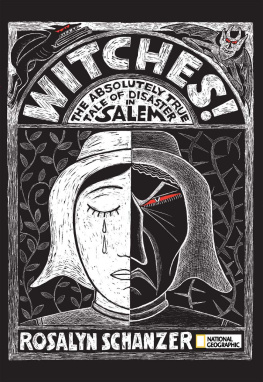Would YOU Join the Madness?
It is a frigid cold winter in Salem Village, Massachusetts in 1692. Some teenage girls may be suffering from mysterious afflictions. They accused certain townspeople of being witches. What would you do? Would you believe the girls? Would you defend the accused during the trials? Find about this tragic period in American history.


Image Credit: Corel Corporation
In this painting, Pilgrims Going to Church by George H. Boughton, churchgoers walk to church. They needed weapons for protection against wild animals.
The Time: The winter of 16911692
The Place: Salem Village, in what is now Massachusetts
It was the coldest winter anyone in Salem Village could remember. Most days it snowed. Some snowdrifts were higher than the houses. The winds were strong and biting. They could knock down a small child. Yet few children went out for long that winter. The weather kept them inside.
Even in good weather, Salem Village was not a fun place for young people. There was not much to do. Salem Village had mostly farms. There was also a Meeting House that served as a church too.
The people of Salem Village were very religious. They were known as Puritans. They lived by the Bible. They believed in hard work and prayer. They were against dancing, card playing, and parties. Salem Villagers thought these things were the work of the devil.
That cold winter the young people of Salem Village were very bored. They mostly stayed at home waiting for spring. But things were a bit more interesting at one house. Surprisingly, it was the home of the Village preacher, Rev. Samuel Parris. The preacher lived with his wife and their nine-year-old daughter, Betty. Bettys eleven-year-old cousin, Abigail, lived with them too. But there was another adult in the household. It was a slave woman named Tituba. Tituba cooked and cleaned. She was often with the girls as well.
Tituba was from Barbados. It is an island south of the United States in the Caribbean Sea. The island was nothing like Salem Village. Many people there believed in magic. At times, they cast spells. They also played fortune-telling games. Such things would never be allowed in Salem Village. Magic, spells, and fortune-telling were thought to be witchcraft. Witchcraft was both a sin and a crime in Salem Village.

Image Credit: Enslow Publishers, Inc.
Salem Village, Massachusetts 1692

Image Credit: Enslow Publishers, Inc.
This map shows where Salem, Massachusetts, is located.

Image Credit: From A Popular History of the United States. Vol. 2 by William Cullen Bryant. New York: Charles Scribners Sons, 1878
Tituba, a slave belonging to Samuel Parris, was at the center of the witch frenzy.
Tituba knew how to cast all kinds of spells. She would also make magic potions. Betty and Abigail loved to hear her stories. So did some of the other young girls in Salem Village. That winter they often visited Betty and Abigail. One of these girls was twelve-year-old Ann Putnam. Some older girls visited too. Among these were sixteen-year-old Mary Wolcott and seventeen-year-old Elizabeth Hubbard. The oldest was nineteen-year-old Mercy Lewis.
The girls liked Tituba. They begged her to teach them how to tell fortunes. But if Tituba agreed, this would have to be done in secret. If Tituba were found out, she could go to prison or even be hanged.
What would you do if you were Tituba?
- Would you say no to the girls? Was it just too dangerous to do magic in Salem Village? Could Tituba be thought of as a witch? OR...
- Would you give in to the girls? Would you make them promise not to tell anyone? But can a nine-year-old and her friends be trusted to keep such a dangerous secret?
What Really Happened...
Tituba gave in to the girls. She told them stories about black magic. She showed them how to cast spells. She said she could see the future in different shapes. The young girls were thrilled. At first, nothing bad happened. But before long, the trouble began.
In January 1692, Betty started acting strangely. Some days she refused to eat. Other times, shed start crying for no reason. She often also became very forgetful.
By mid-February Bettys cousin, Abigail, wasnt better. Her behavior frightened people in Salem Village. Without warning, shed fall to the floor. Lying there, her whole body would shake. Now she often made little sense when she spoke. No one understood much of what she said.

Image Credit: From Giles Corey of the Salem Farms (1868), in The Complete Poetical Works of Henry Wadsworth Longfellow, Boston, Houghton, 1902
Tituba performed acts of sorcery for Betty Parris, Abigail Williams, and other children in the kitchen of the Parris house.
Dr. William Griggs was Salem Villages doctor. He examined the girls. But he couldnt find anything physically wrong with them. He decided that they must be bewitched. He didnt know what else could be causing this.
That frightened people in Salem Village. Was there a witch among them? The Villagers hoped not. But the girls did not get any better. Instead, things got worse.
The problem spread. Bettys and Abigails friends started to act strangely too. Before long, Ann Putnam, Elizabeth Hubbard, Mercy Lewis, Mary Wolcott, and others began acting odd. Theyd thrash about on the floor. Sometimes, they would shriek and point to something that wasnt there. Often they seemed to slip into a trance. Theyd also hide in a corner and cover their heads. They seemed to want to protect themselves from some terrible unseen demon.
The important men in the Village wanted to know the truth. They were worried about the girls. So they questioned them almost daily. The men demanded that the girls tell who bewitched them.
What if you were an official in Salem Village?
- Would you take this case very seriously? Would you bring charges against anyone the girls said bewitched them? Would these people be tried in court? OR...
- Would you see things more calmly? You know the girls were very bored that winter. Could they be pretending now? Maybe these girls just want attention. Should you take their actions seriously?
What Really Happened...
At first, Betty would not give any names. Then she finally said that Tituba was a witch. Tituba was easy to blame. As a slave, she had no rights.
But the girls did not stop there. They began to name others too. They named women who had never done magic. Yet the girls got away with it. These women were old and poor. They were not well liked and had few friends. If they were accused of being witches, no one would defend them.



















